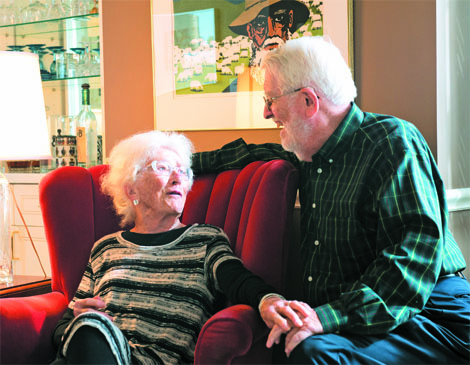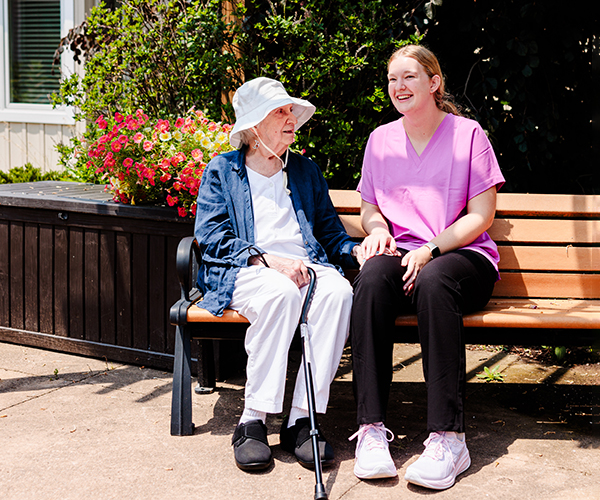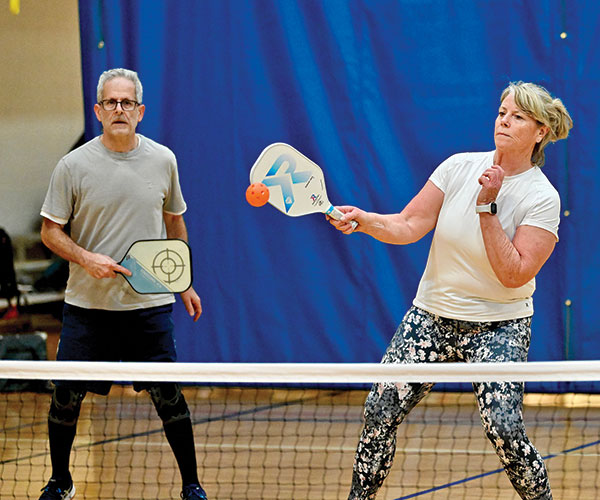Moving to an independent or assisted living facility doesn't mean seniors slow down — in fact, some even speed up.
"I stay so active that I have to try to be inactive so I can meet people here," says 72-year-old Mariam Pledger, who lives at McGregor, an independent and assisted living and nursing facility nestled near Case Western Reserve University and Lake View Cemetery.
Pledger, who has lived at McGregor for nearly five years, volunteers at schools on Cleveland's East Side, teaching children about fictional and real-life superheroes to build problem-solving skills and self-esteem.
Today, more than 735,000 seniors live in assisted living facilities across the country, according to the National Center for Assisted Living. Recent research has shown that by maintaining an active lifestyle that goes beyond attempting word puzzles and playing bingo — think learning a new hobby or launching a small, second career — seniors can live longer, healthier lives. In fact, research by Concordia University showed that seniors who engaged in demanding activities over a three-month period staved off mental deterioration longer than those who used their retirement years to relax. Some, the study found, even improved their mental condition over the course of the research.
Active seniors such as Pledger are challenging independent or assisted living facilities to keep up. McGregor hosts art and pottery classes, boasts a choir and even throws on-campus clambakes to keep up with demands for activities.
At Judson, an independent and assisted living facility at the edge of University Circle, the staff is exploring a partnership with CWRU that would allow its residents access to the campus library, student center and university programs, for example. "It's no longer enough to have a simple affiliation," says Rob Lucarelli, communications director at Judson. With the proposed partnership, Judson residents can take part in the benefits afforded a student without the need to attend university classes. Alumni of the university could also receive a discount for living at Judson.
We share with you why four seniors are passionate about staying active.
Harmonious Duet
Virginia Havens has trekked 100 miles of Spain's Pilgrim Trail, banded birds in the Montana mountains and now, one day each week, the 5-foot, 88-year-old positions herself across a table from four felons and trains them on how to appear professional during an interview.
"I try to get them to present the very best of themselves, because they've all paid their penalties," Virginia says. "They really have a right to start fresh."
From his red wingback chair in their living room, her husband, George Havens, stresses his diminutive wife's bravery. "You do realize that some of these people are murderers and rapists?" he says.
"But there's no difference between us," Virginia insists. "I've had three great compliments in my life, and I will tell you one of them." She'd worked with a man convicted of three felonies, she recounts. When he returned to his regular class in the prison, the teacher asked, "How did you get along with Mrs. Havens?"
"He said, 'I learned a lot, but she's one tough cookie,' " Virginia recalls. "And I thought that was wonderful because I think of myself as being rather quiet and restrained, and I can't imagine being a tough cookie."
At 65, the mother of three began volunteering for Cleveland Works, now Towards Employment, after she retired from teaching English at Cleveland's Law and Public Service School. "I needed something to do," she says simply. "And I profit tremendously from being there, probably more than they do."
A year later, George also retired after 40 years at the Jayme Organization, where he served as chairman and CEO. He wasn't idle long. The now-90-year-old launched Strategic Consulting, conducting business seminars, planning sessions and offering one-on-one advice to area organizations.
Three days a week, George also teaches the Traditional Jazz Trilogy, three eight-session courses he developed on jazz music at Case Western Reserve University's off-campus studies department.
"I've been a teacher all my life," George says. "I viewed my job as helping the people in my organization be successful. If they're successful, I have nothing to worry about — I will be successful."
From their home at Judson Manor in University Circle, the couple can walk to the CWRU campus. George teaches, and Virginia attends classes that she audits each semester. She has taken the history of rock 'n' roll and Byzantine history, and is enrolled in a museums and globalizations course. "There's so much to do," she says. "There almost isn't time to do it."
George has also written six self-published books, including A Professional Guide to Winning Presentations; A Special Time, A Special Place: East Cleveland Remembered; and The Prize: An Adventurous Life, which chronicles the couple's backpacking adventures through 15 states and five countries.
"We didn't have the money to travel lavishly," Virginia says. "We couldn't go places and stay in hotels and flit around the country in airplanes. I think it was a blessing we didn't have money. I think that's a wonderful way to live, to not have too much money."
Their love of the wilderness ultimately led them to live part time in Bozeman, Montana, for nearly 16 years. "But we had to choose whether we were urban or rural, and George allowed me to make that decision for the both of us. And I surprised myself by realizing I am more urban."
When they returned to Cleveland, they selected Judson so they could maintain their busy, adventurous lifestyles. From the 1923 building's rooftop terrace, residents have 360-degree views of University Circle. Inside, the converted hotel offers an art studio, solarium and even an indoor heated pool.
"We are in the midst of University Circle, which is a real hot area of Cleveland, and it's replete with eds, meds and culture," George says. "There are some 40 different institutions on our doorstep. We walk to Severance Hall for concerts. We walk to the art museum."
Virginia nods. "I walk out my door, and it's a treasure house of things that are possible to do. There is so much to make life very exciting here. You can hardly stay home. It's hard to stay home."
Heroic Deeds
Mariam Pledger retired — or resigned, as she puts it — at just 45 years old.
Pledger started her career as a mathematician at the U.S. Army's Frankford Arsenal in Philadelphia, became a high school math teacher and finally, worked as a middle school guidance counselor. But by 1987, troubled by what she saw in the schools every day, she left Monticello Middle School in Cleveland Heights.
"I was just so burdened about the way the youth was headed," says the 72-year-old, who lives at Cleveland's McGregor. "And their parents don't seem concerned."
Too many children came into the schools unprepared. "It's just appalling," she says.
So Pledger attended training courses through the local Child Evangelism Fellowship, learning to teach children essential life skills, such as problem-solving, paired with messages of faith and hope.
"I thought they needed to get a real relationship with someone who really loved them as they were, and that was the God of the Bible," she explains.
Pledger began by volunteering at summer Bible camps, but within a year she approached schools on Cleveland's East Side about offering her programs and training in an after-school format.
She instructs at nearly 10 East Side schools, including Andrew J. Rickoff in the Kinsman neighborhood, Patrick Henry in Glenville, George Washington Carver in Central and Mary B. Martin in Hough. She focuses on kindergarten through eighth grade.
In schools where her programs haven't yet been approved, Pledger volunteers in kindergarten classrooms and during lunch hours. "Some of the children can't even open their own milk," she says.
Pledger's curriculum rotates, and over the years she's trained five other women to teach at various schools. Currently, Pledger's program is called Dare to be a Superhero. She tackles the stories of Superman, mentioning his Cleveland roots, Batman and Spider-Man, then presents newspaper stories to the children to show what she deems real life heroes. Pledger also shares with the students — about 60 total across all the schools — Bible stories that showcase young people making courageous decisions.
"I ask them to think of something that makes them very sad or that makes them very angry, and then I ask them, •What you could do about it?' " Pledger says.
It's all an effort for them to write their own stories of heroism.
"Brainstorming is something that I hope will get into their psyche," she says. "Sometimes, I have to help them with the answers, but one big thing they come up with is to just tell someone."
Once they have their plot, the students make their own comic books, which Pledger helps them write down.
Back at McGregor, a continued care retirement community on 32 acres of manicured grounds, gardens and courtyards with views of Lake Erie, director Patrice Brady praises Pledger's efforts. "She also puts inspirational messages around the home for all of us to enjoy," she says. "They really brighten our day. If I know someone is in need, she is the first person I turn to."
Pledger blushes. "There is a lot seniors can do," she says. "When I talk to people about how I see myself as a senior, I reference a photo of a woman younger than me who is running and jumping hurdles. That's how I see myself, as a runner — as you get older, you're getting closer and closer to your finish line, so you better jump. A lot of seniors just sit back, but that's when you really jump and get involved."
Second Chance
Ruth Ann Clark doesn't particularly like flea markets. She never visits antique stores. And she wouldn't be caught dead inside somewhere with "resale" in its name.
Yet, the 74-year-old found herself intrigued two years ago when a fellow resident of Kendal at Oberlin announced she'd be leaving her post as chairwoman of the Residents' Assistance Fund. The volunteer-run organization takes in and sells Kendal residents' unwanted property for cash, which is then funneled back into the community to assist those in financial need.
"It's a job for which people do not volunteer, and yet, I did," Clark says. "I know how to work with people, I know how to organize, I like to sell and I know how to lead, and I thought that might be useful."
Since she took over the organization, now renamed Reasonably Assessed Finery and Furnishings, Clark has cleaned, polished, washed, ironed, hung, displayed and priced thousands of dishes, clothes, figurines, teacups, desks, sofas and more.
On a recent afternoon, Clark wanders through the organization's inventory, which includes a turquoise bar cart for $12, a pair of vintage black-and-white prints for $15 and a four-person wooden dining table for $25.
"People brag about the bargains they get," Clark says.
Before she and her partner, Ardith Hayes, came to Kendal in 2011, Clark lived along the California coast and worked as a pastoral therapist. She counseled people struggling with depression or marital strife, those who weren't sure what they wanted to achieve in life or those who felt they had failed at their goals.
"I speak two languages — the languages of theology and psychology — so whatever language they chose to use I was prepared to use," she says.
She retired in 2006. The pair chose Kendal, a continuing care retirement community with independent and assisted living and a nursing home on campus, for its central location between Hayes' children in Illinois and Clark's family in New York.
Last year, Clark even launched a fashion show, where anyone — from wheelchair-bound residents to children of staff members — can strut through the community dining room to show off their Reasonably Assessed Finery and Furnishings purchases.
"It was a smashing success," Clark says. "We filled the dining room twice."
What doesn't sell gets donated. In the past year alone, she contributed 3,229 pounds of books, records, CDs and tapes to Friends of Oberlin Library; 1,700 pounds of clothes and shoes to Goodwill; and 30 pounds of linens, 30 pounds of towels and 28 pounds of kitchen furnishings to Family Promise.
"One of the things that I like about Kendal is its focus on the well-being of the environment, which includes not polluting the environment with things that we think we don't want anymore but that still have quite a bit of life in them," she says.
And while she enjoys its neighborhood feel, the fourth generation Californian especially likes the garage attached to their private cottage. "I've scraped enough ice to know if I was going to live here, I needed a garage," Clark says.




